Table of Contents
- Parenting cartoon, “What’s a Housework with No Name?”
- Visualization: Why are men not making progress in housework and childcare?
Parenting cartoon, “What’s a Housework with No Name?”
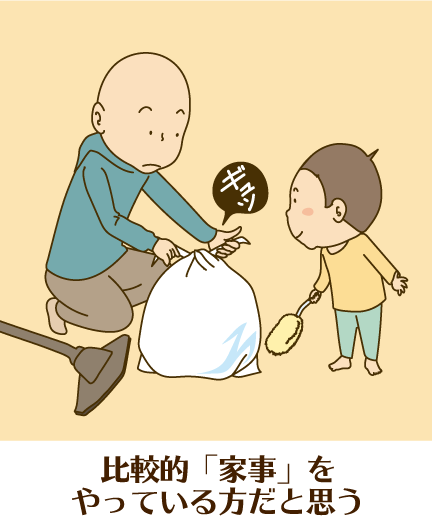
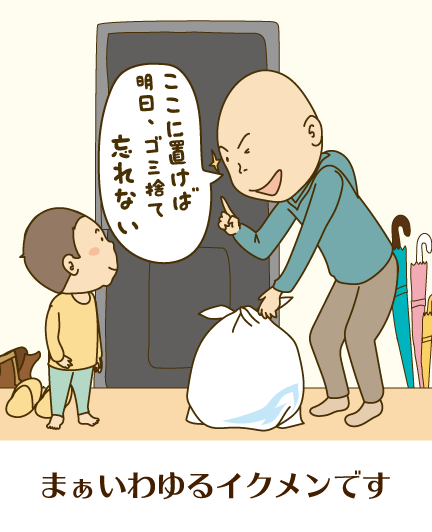
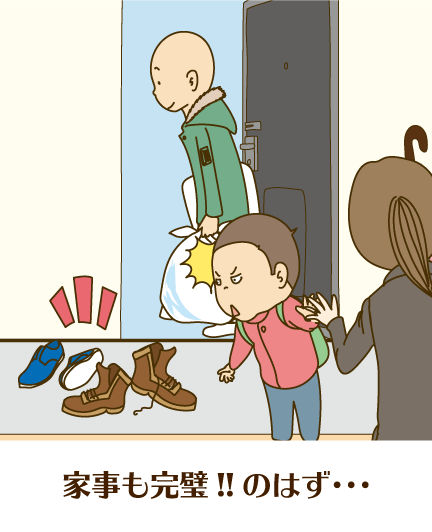


Profile
Eiichi
After working for a design company in Tokyo, he became a freelance illustrator. He is a hard-working father who creates animation, manga, and illustrations, including winning the Yubari International Fantastic Film Festival’s International Short Film Showcase Division Excellence in Animation Award.
〈Practical】Let’s get started! Housework and childcare
The frustrations of dads, the frustrations of moms.
What do you think?
In order to promote greater participation of fathers in housework and childcare, it is important to learn more about the frustrations and problems of both fathers and mothers. We asked Rie Yamaguchi, a post-paternity leave consultant who has seen many generations raising children, and Manabu Tsukagoshi of the Toray Management Research Institute for advice on each issue.
Fathers’ participation in household chores and childcare is progressing. However, there is a polarization between those who are active and those who are not. Among these less active people, there are many who actually want to do it.

Worked in software development, design, and product planning at a general electronics manufacturer, took maternity leave twice, and worked up to the position of general manager. Since 2014, she has been a support member of the “Ikubosu” alliance of companies.
That is true, and according to the Ministry of Internal Affairs and Communications’ Basic Survey of Social Life (Rates of Childcare and Housework-Related Activities for Husbands with Children Under 6 Years of Age in Two-Worker Households, 2016 survey), fathers are spending more and more time on childcare.
This is due to the fact that about 30% of fathers who are interested in housework and childcare have become more actively involved, while the remaining 70% are actually not able to act. My sense is that they want to, but are not able to. My impression is that many of them are not able to take action due to structural factors such as work or family environment.
In addition, although the number of dual-earner households has long since surpassed that of full-time housewife households, the number of mothers in these increased dual-earner households has only increased in part-time, temporary, and other non-regular employment. It can be said that the Showa-era division of labor between male and female roles has not led to any major structural change.
The involvement of fathers in housework and childcare is different. Many fathers say, “Kids are cute,” so they take care of the kids, but not so much the housework.
Indeed, Japanese fathers do far less housework than their counterparts around the world (laughs).
In many cases, moms will not let go of their chores. In some cases, there is a sense of guilt for not doing the chores, or they have done them and don’t like them, so they don’t ask anymore. If the couple can consciously create an equal relationship, the sharing of responsibilities will go much further.
Dads feel they have to do it too, and moms are more likely to tell dads…. For this reason, we need an environment in which everyone can work, such as the development of daycare centers and free childcare for school-age children.
It is certain that awareness will not change unless the social structure changes, such as shorter working hours for fathers and a maternity leave system. However, what we can do before that is to have communication between husband and wife. This is not enough at all.
Below are some examples of complaints and problems of fathers and mothers related to housework and childcare that are often discussed. Why not create an opportunity to talk about their own themes?
‘I help with the housework, but my wife tells me I don’t do anything, so I’ve lost the motivation to do it.’
Although you are sitting back on housework and childcare when you say, “I’m helping,” you should be willing to share and enjoy yourself in the housework and childcare. If you are good at some of the household chores, such as taking care of the children for the day, or cooking or cleaning, you can declare, “I’ll do this part,” and let them take care of it. If it’s something you like to do, you will be better able to get it done.
It is important for moms to leave the housework and childcare to dad, even if he is not able to do it well. Dads will also start to make their own trial and error by being expected by moms, and their awareness will change as they experience housework and childcare.
It’s called “receiving help,” and being able to say “help” is another important skill for moms. Whether at work or at home, being able to say “help” to dad, parents, or the community, or being able to leave it to them, is very important for sharing household chores.
‘I want to see my kids after work, but they tell me not to come home early because they’ll wake up.’
Many mothers have trouble with dad coming home at the halfway point when they are putting their children to bed. If the couple has a shared child-sleeping time, then the dad can try to come home quietly or read a book or put the child to bed instead of the mom. If the mom’s side excludes the dad and sticks to her own ideal style, it will be difficult for them to work together on housework and childcare.
They tell me to come home early, but I can’t because everyone around me is working.”
So you think that reading the atmosphere at work is more important than meeting your wife’s needs. It is a question of which is more important, and if you want to go home, you can go home. The more serious cases are those where the workload is so heavy that the work cannot be completed, so they cannot go home.

He has an established reputation for corporate consulting on diversity, work-life balance, and work style reform, as well as building and proposing effective training and workshops for the workplace. having taken childcare leave in 2009, 2011, and 2014, he is also an expert on male participation in childcare and household chores and child-rearing support.
Recently, we asked some fathers who work in companies about their dissatisfaction, and one said that his boss gives him a disapproving look when he tries to leave before 9:00 p.m. We need to develop “ikubos*,” but many workplaces are understaffed and difficult to train. Bosses who are considerate and understanding of their subordinates’ and colleagues’ childcare and nursing care needs.
Japan’s population estimates indicate that there will continue to be a shortage of labor in the future. The demand for “ikubos” (bosses) who can improve the quality of teamwork and human relations among the same members, thereby increasing results and achieving work-life balance, is also the demand of the times.
Hiroki Sato, a professor at Chuo University, suggests “It doesn’t have to be every day, so decide on two days a week when you go home on time and always have dinner with your children. Moms know when dads are coming home, and dads have an incentive to go home. Even at work, it is easier for them to go home because “today is an early home day. It gives them a sense of energy at work, and they can go home early and do such household chores as bathing their children, watching their homework, cleaning up, and so on, naturally. If you want to see your children’s faces, as in the previous point about dads’ frustrations and problems 2, you can come home early when they are awake.
You have to be willing to work early and take advantage of no-overtime days. In this transitional period, it is impossible to balance work and child rearing without one’s own determination and resolve. Don’t read the air in the workplace, but do not read the atmosphere in the workplace, but do first verbalize your thoughts and feelings to the workplace and then do it.
I believe that many families where fathers who prioritize work over housework and childcare can raise their awareness are those where moms do not give up and talk about housework and childcare on a regular basis. In some cases, when the topic was discussed at our seminars and other events, the conversation connected with the idea that “this is what mom was talking about,” and they were able to do it.
Dad doesn’t like to be told by Mom (laughs). (Laughs) “Oh, so that’s what it’s all about. And the same thing becomes clear to me when I hear it from an expert or a practitioner.
I chose to work shorter hours after maternity leave because the company told me it was okay to work shorter hours. I really wanted to work more, but I couldn’t talk to my husband about it.
By accepting the shorter hours without saying anything, Dad will take it as a sign that he is fine with his current style. First, it is important to talk with your husband. If their attitudes toward the way they work become equal, their housework will also become equal.
I can’t expect my dad to take care of the housework and childcare. It’s easier to do it myself.”
We need “team parenting.” As is the case at work, when you try to do things as a team, you have to teach the other person, they don’t work the way you want them to, and it is a lot of hassle. Furthermore, it is said that there will always be a period of confusion in a team. A period of increased conflict, anxiety, and giving up. This is where you leave the team on your own and become a one-man operation. Once the confusion period is over, the team develops from the standard period to the achievement period, just as in work. It is necessary to be patient and foster teamwork even during the period of confusion. What facilitates team parenting for dads is understanding from the workplace and expectations from the wife. This expectation is not a level of help, but a level of sharing.
For example, when asked at the seminar if the couple discussed which one of them would take the maternity leave, few hands went up. This is a sign that moms think it is theirs to take and do not expect dads to share in the maternity leave. In addition, some companies have recently begun to encourage 100% of fathers to take childcare leave or require fathers to take one month of childcare leave. There are more and more cases where this kind of understanding in the workplace is encouraging fathers to participate in childcare.
When I prepare dinner, our house is in a state of warfare, but my husband is either asleep or watching TV.”
Mom is thinking, “I have to do this and that at dinnertime while I’m getting ready for dinner. If mom is in control of the household chores, dad should ask, “What do you have to do now? and share the chores. When you realize that dad can do quite a bit too, you will feel less frustrated.
Yes, it is irritating when one of us is absent while the other is doing childcare chores (laughs). (Laughs) As one solution, we recommend parallel child-rearing chores. For example, when the mother is cooking a meal, the father takes care of the children, and the couple does childcare chores at the same time. For example, when the mother is cooking a meal, the father takes care of the children. This is a way of saying, “I’m going to do 00, will you do 00?
With the house being a battlefield, fathers also need to be flexible, so it is important to reduce the number of “childcare chores that cannot be done,” even if they are good at them or not. At that time, too, mothers should refrain from “giving out the 3 commands” (no, no, no, no, and no). This is because people tend to stop doing things if they don’t like what they do immediately after they do them.
The first thing to do is to say “thank you” for any result or action. It is very important for dads to be able to say “thank you” for mom’s quality housework without taking it for granted.
Let’s do it!
Household chores with no name” checklist
Do you think that housework is only cooking, laundry, and cleaning? There are many “unnamed chores” in our daily lives. If you have not even noticed the existence of unnamed chores such as changing shoes and toilet paper, please check them out with the checklist presented here. Let’s consult with each other and try out these nameless chores that even beginners can do.
“Add-on” housework
- (1) Toilet paper, tissue paper, hand soap and soap replenishment
- (2) Replacement of toothbrush
- (3) Making and buying tea
- (4) Check the remaining amount of disposable diapers and formula – Purchase
Replenishment chores that can be done at any time in your life scene. These are very beginner-friendly chores that can be done when you go into the bathroom, when you open the refrigerator, and with just a little bit of awareness. If you want to start, start with one of these.
A “one-time-only” chore
- (5) Match the shoes at the entrance
- (6) Clean toilet bowl, back of toilet seat, wipe toilet floor and hand washing area
- (7) Remove debris and hair from bathroom drains
- (8) wash a gargle cup
- (9) Replacement of hand towels
- (10) Cleaning oil splashes and spills on stove and microwave
This is also a chore that can be done “as soon as you notice it” in your daily life, regardless of time. When you put your own shoes together at the entrance, you can also put your family’s shoes together. It is also recommended that you decide on the timing of your cleaning, such as a quick cleaning while using the restroom.
Housework in “free time
- (11) Dust the tops of furniture and around appliances
- (12) Cleaning up the floor
- (13) Cleaning filters of air conditioners and other air conditioning equipment, filling and disposing of water in humidifiers and dehumidifiers
It is somewhat intermediate in that you need to be aware of places you don’t use. Nevertheless, it is a chore that can be done in your spare time when you are at home. Like using the time during TV commercials, while the coffee is brewing, etc. Choosing appliances that are easy to maintain will also reduce the burden of housework.
Dad’s “regular” chores
- (14) Collect trash from the trash cans in each room and separate it.
If the trash cans are dirty, wash them and set new trash bags. - (15) Bicycle and car maintenance
(For bicycles, air and oil. For cars, gasoline, inspection, etc.)
Even if they are not usually very active in housework, many men may say, “I’m doing this!” Even if they are not active in household chores, many men may say, “I’m doing this! However, it would be perfect if they could take garbage disposal one step further from just carrying the garbage from the entrance to the dump site to putting the garbage together and setting a new garbage bag in it! Bicycle and car maintenance is also a great chore. Make sure to check on your family members’ bikes and cars as well.
“Cleanup” chores
- (16) Put away your purchases and put away your shopping bags.
- (17) Preparation before taking children to play (play equipment, diapers, milk, food, drinks, towels, etc.), cleanup afterwards (putting away play equipment and items brought, washing children’s hands, changing children’s clothes if they are dirty, etc.)
Shopping and playing outside with the children do not end with just going out. Cleaning up and cleaning up after you get home can also be fun and enjoyable if you and your spouse do it while conversing together.
Children’s school-related chores
- (18) Identification and purchase of necessary items for kindergarten, preschool, and school
- (19) Filling out and preparing documents to be submitted to kindergartens, nursery schools, schools, and government offices
- (20) Check homework, sign read-aloud cards, fill out contact sheets, etc.
Various school-related tasks for children can be surprisingly burdensome. In order to actively participate in childcare, try to share the workload where you can. You may not be able to do it every day, but you can start by checking homework on the weekends. You will learn a lot about how your child is doing, and this can be a rewarding experience.
Start with one thing at first and make it a habit.
There are many small “unnamed chores” in the household. The reason we always have clean towels is because someone in the family changes them. If we can notice these chores, we can find many things we can do in our daily lives by being a little more aware of them.
I know there will be times when you say, “I don’t know how to do this,” so it’s a good idea to give your wife a shout before you do it and ask her for advice. After listening carefully to the other person’s particular needs, both parties can comfortably share the small household chores of life. In this way, you will naturally feel a sense of gratitude toward your partner.
You can also review your household chores, such as reducing the frequency of refills and replacements and making better use of disposable types. You can also discuss ideas such as using longer rolls of toilet paper that can be changed less frequently, or reducing the number of shoes to make it easier to keep the entryway clear.
Finally, the important thing is to be able to continue. The trick to making it last is not to try to do everything at once, but to make it a habit one easy thing at a time.

Planned and developed ” Yieto” (https://yieto.jp ), an application that visualizes housework tasks for married couples and supports stress-free sharing of tasks. Her goal is to realize a future in which the free labor of housework is not too much concentrated on one person in the household. She is the mother of a son and a daughter, and is a household appliance fanatic.
I think I can do this!
Small ways to make housework fun and
Amazing skills to challenge you.
Sachiko Wada, who runs “Tuskaji,” a matching site for the best housekeepers, introduced “housework tricks” that, with a little ingenuity, can make housework more enjoyable and efficient.
Before sharing household chores, it’s important to agree on a family image for the two of you.
Unlike child rearing, which has the clear objective of “having and raising children,” housework is an incidental task in daily life, so couples tend to push each other around. First of all, I think it is important for couples to face each other and put into words what kind of family image and future they both have in mind, including housework. Working backward from there, I think it is a good idea to think about what their current lifestyle and sharing of responsibilities should be like.
Each couple has their own strengths and weaknesses, likes and dislikes in household chores. It is important to pick up chores that do not stress each of you and recognize that each of you enjoy folding laundry, shopping, cooking, etc. It is important to convince each other that it is “fair,” such as sharing chores that you both are not good at. At first, it is a good idea to write it down and “visualize” it.
Dad and mom may have very different levels of knowledge about household chores. After simplifying the procedure, it is necessary for the two of them to standardize and share procedures and frequency, just as in a factory.
We are sometimes asked by moms about cases where dads are not able to make chores their own. When I tell them where to put the diapers and they ask me repeatedly, it makes me sad because I think, “If it were my job, I would learn and take notes, but he doesn’t care about where to put the diapers…”
Mom wants us to work together to manage the family. And instead of working under instructions from mom, we want them to take the initiative in housework and childcare, and to think together about “how to solve” problems that appear before them.
When their awareness changes like that, they will receive more and more information about housework and childcare, they will become more creative, and they will hone their skills. Many mothers feel lonely because they are not able to think about this together. With the mindset that moms are the leaders and they are the menial workers, no matter how much housework they do, it may not be appreciated.

After graduating from Yokohama National University with a Bachelor of Business Administration, he joined Fujitsu. After graduating from Yokohama National University with a Bachelor of Business Administration, he joined Fujitsu Ltd. as an engineer and was involved in the development of ERP products. In order to realize her own challenge of “balancing housework and work,” she launched “Tuskaji,” an online housework service provider. Received the Nikkei Woman of the Year 2018 “Working Style Reform Support Award”. Mother of one child.
People who like to clean say that places where the difference between before and after cleaning is clear make cleaning fun. Window cleaning and the area around the exhaust fan are places where beginners can enjoy cleaning.
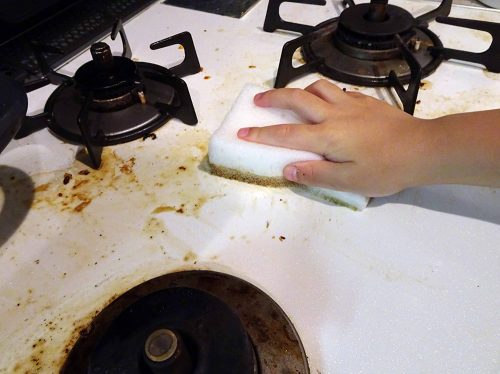
Take, for example, toilets. If there are men in the home who do their business standing up, there will be urine splatter on the walls and floor. Wipe them down with a paper with cleaner sprayed on it. Mud on shoes in the entryway and toothpaste in the bathroom can also be found.
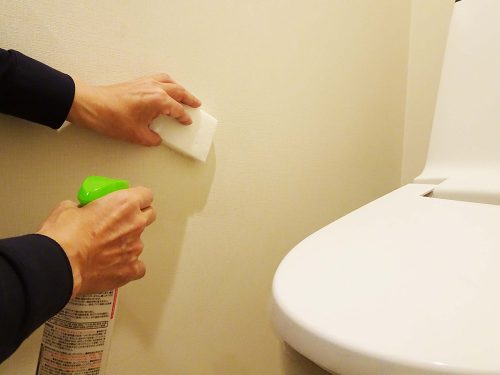
On average, men are taller and stronger than women. Dads should take an active role in taking out bulky trash as well as ventilation fans, windows, and other high places. Bulky down quilts and comforters can be wrapped compactly in sheets to save space.
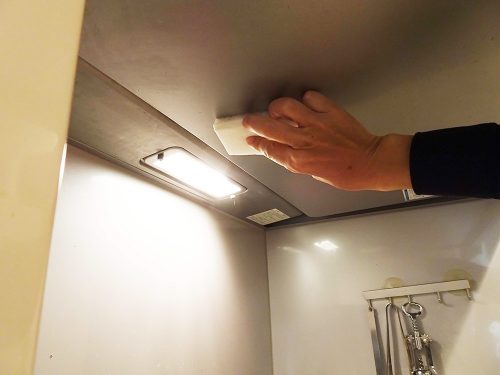
The key to sharing household chores between husband and wife is to make rules and standardize them. Separate baskets for washing water and fashionable clothes so that they can be quickly identified. Narrow down the types of detergent used as well to simplify the rules. If you want to speed up the storage process, make a rule that clothes are put on hangers and socks and pants are stacked, not folded.
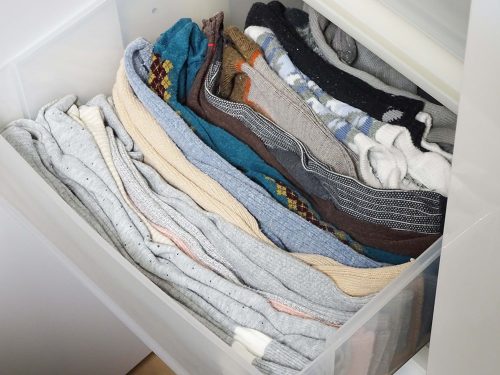
Labeling the names of seasonings and other items on both the placement and the bottles makes it easy to quickly find and manage the stock of supplies.
Pinch hangers should be “arched” with long ones on the outside and short ones on the inside, and large towels should be “jambara dried” so that there are no overlapping surfaces. Special work with special techniques resonates with men!
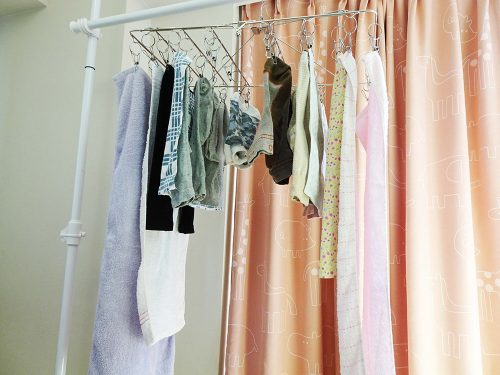
The technique is to focus on the things that are fun to use and good for the first army.
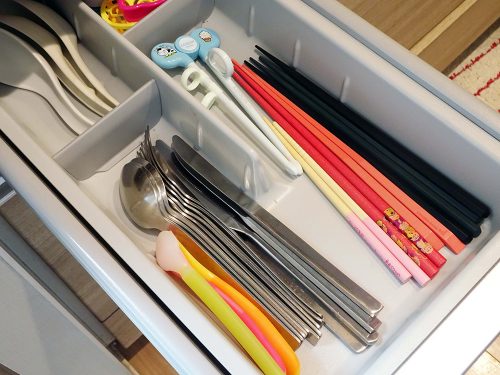
Food preparation is done in batches on Saturdays and Sundays. Remember that potatoes and pumpkins can be difficult to freeze in a tasty way. I also outsource tasks that I am not good at to family members who are familiar with them or to an outside contractor. The Tuskazi can make about 15 dishes in three hours, so I want to master that skill!

Reference: “Tuskaj-san’s Rakku Kajo BOOK, the Housekeeper Who Can’t Get Reservations” (supervised by Tuskaj-san, published by Fusosha).
The charismatic housekeepers Sunny Haru and Stella from Tuskazi, who finish housework within a limited time, introduce their tips for easy housework.
https://www.fusosha.co.jp/books/detail/9784594081058
Men’s participation in housework and childcare is still the ideal
Start with what you can realistically do.
Let’s be a “Hutsumen”!
Men should participate more in housework and childcare, and take childcare leave. It is necessary to encourage fathers to do so. However, what we should not misunderstand is that this is an “ideal. If it is perceived as if men’s participation in housework and childcare has become the norm, it will not be a message of support at all, and on the contrary, it will be a disappointment.
Since Japan’s period of rapid economic growth, the division of labor – men at work, women at home – has been prevalent and continues to this day. And the working style of men is based on the assumption that they work full time, five days a week. This is why even single people don’t take paid leave properly, and why you often see reports on Facebook, etc., such as “I’m sorry I took a paid day off today,” based on the awareness that it is “against the rules. Naturally, the rate of male employees taking childcare leave is not increasing, and even shorter working hours are not a good idea.
In addition to these cultural aspects, there are also practical issues. In the Gender Gap Index, which measures the gender gap between men and women in each country, Japan ranks 110th out of 149 countries. When the salary of a full-time male worker is set at 100, the salary of a female worker is around 70. Given this disparity in wages, it is the wives who are most likely to take childcare leave and work shorter hours.
In contrast to the “male-dominated” society that the corporate world still is, the local community is a “female-dominated” society. I have a 3-year-old son, and when I go out with him on weekdays, women are overwhelmingly present. I feel uncomfortable in places where I feel close to people, such as hospitals and children’s centers.
When my son was a baby, you took him for vaccinations. When I did, the nurses and doctors obviously treated me like I was a bad person. They would say things like, “You have to hold the baby like this and let him put his arms out,” or “Oh, you have such a funny way of holding him.” It’s true that my handholding may not be as good as I remember. But I was still trying my best, and when I was treated in a way that said, “That’s about all you can do,” it made me feel really bad.
At that time I understood how women feel when they are assigned only light duties after working shorter hours. The discouragement I felt was parallel to the area of work, and I think it is the same as when women who are responsible for childcare or caregiving feel bad when they are treated as an “extra”.
The ideal of gender equality is an ideal, but the reality is that it has not been realized. So what should we do about it? This needs to be separated into what we should think about in the long term and what we can do right now.
For example, our child attends an unapproved daycare, but given the ratio of approved preschools, he will probably go on to elementary school. Then the issue of children on waiting lists becomes a meaningless issue for our family, unless a second child is born. It is also irrelevant to those who got approved in the first place or those who do not have children to take care of at daycare centers. But unless there are a certain number of people who continue to say, “This is not right,” the problem in our society will not be solved.
The life span of an individual and the pace at which society changes are completely different. Scandinavia used to be a culture of gender role division of labor, but over the past 30 years or so, they have steered the course toward gender equality. Even if there is no benefit to me, if it is meaningful for the future, I will continue to make some kind of commitment to social issues. It is difficult, but very important.
On the other hand, there is something we can do immediately. That is to “notice. When I once asked at a workplace training session for all young women, “Is there anything you don’t like your male boss to do for you?” the most common response was, “Being told to hand out souvenirs. Men subconsciously think, “You are a young woman, so you should do your chores. This can be resolved if each one of us is mindful of this issue, and it is fundamentally connected to the problem of “invisible or unnamed chores.
Not a few husbands just look at the dishes in the sink and think, “Oh, the dishes are piling up,” but they don’t wash them. Why did I try to pass myself by? I think it is extremely important to become aware of the fact that we have been passing over things thinking, “This is the role of women.
I am in charge of taking the children to and from daycare every day; ten years ago, men would have been a rarity, but I don’t think anyone thinks so nowadays. It is important for society to change, even if gradually, to increase in numbers and to become accustomed to seeing them.
Compared to rural areas where grandparents’ homes may be located on the same property, raising children in the city means that there are usually no blood relatives nearby who can be expected to help, and community ties are not as strong. What is important, however, is to be aware of this reality and how you can compensate for it yourself. Check the website of the local government where you live and know what services are available. You can also get local information from small conversations with other mothers and fathers when you drop off and pick up your child at daycare.
On the other hand, there are also advantages unique to urban areas. There are probably not many places other than Tokyo where events are frequently held where you can hear about the child-rearing experiences of celebrities, and there are also many facilities where you can take your children out, such as zoos and aquariums. I have annual passports for three different facilities, and I choose the one that best suits my child’s needs that day.
I have always preferred “futsumen” instead of ikumen. I understand “ikumen” as an idealistic term. But these days, the word is already stuffed with all kinds of stuff, and it’s like, “I do housework and childcare, plus I can work, and in some cases, I’m good-looking and stylish.
Instead, I think it is better to think about what things can realistically be done for “normal men” without getting worked up about it. I think the reason you don’t do things like the unnamed chores yourself is because you have the mindset that you should just let your wife do the tedious stuff.” . If you can deepen your awareness to this point, you have come to a pretty good place. If we can move into action, saying, “Then what should we do?” then I think we will see a change in men.
I hope you will value both the three steps of “notice, recognize, and act” on what is right in front of you, as well as maintaining awareness of problems that cannot be solved immediately.














